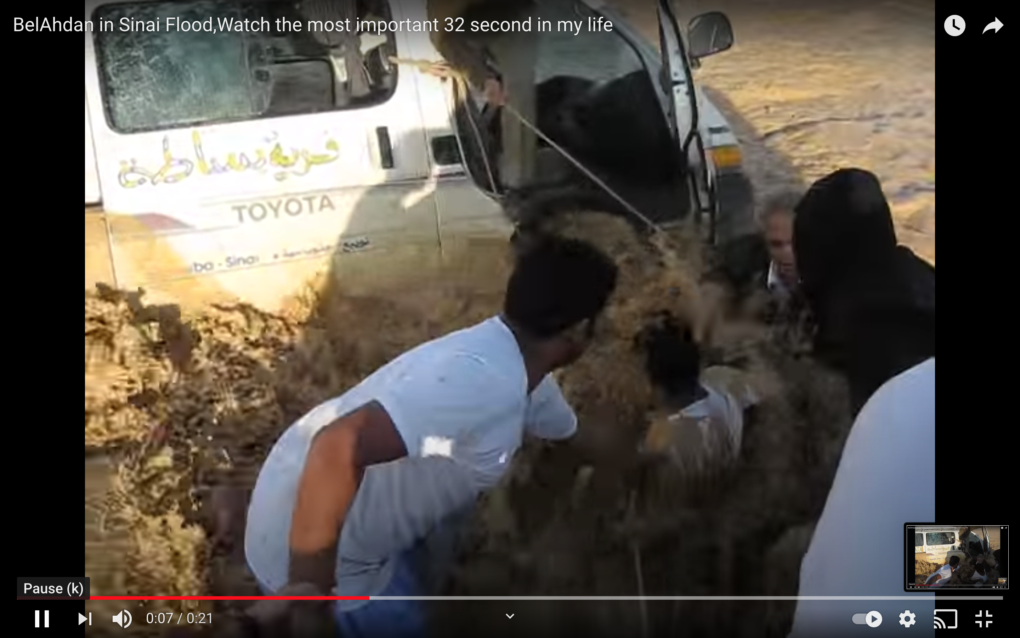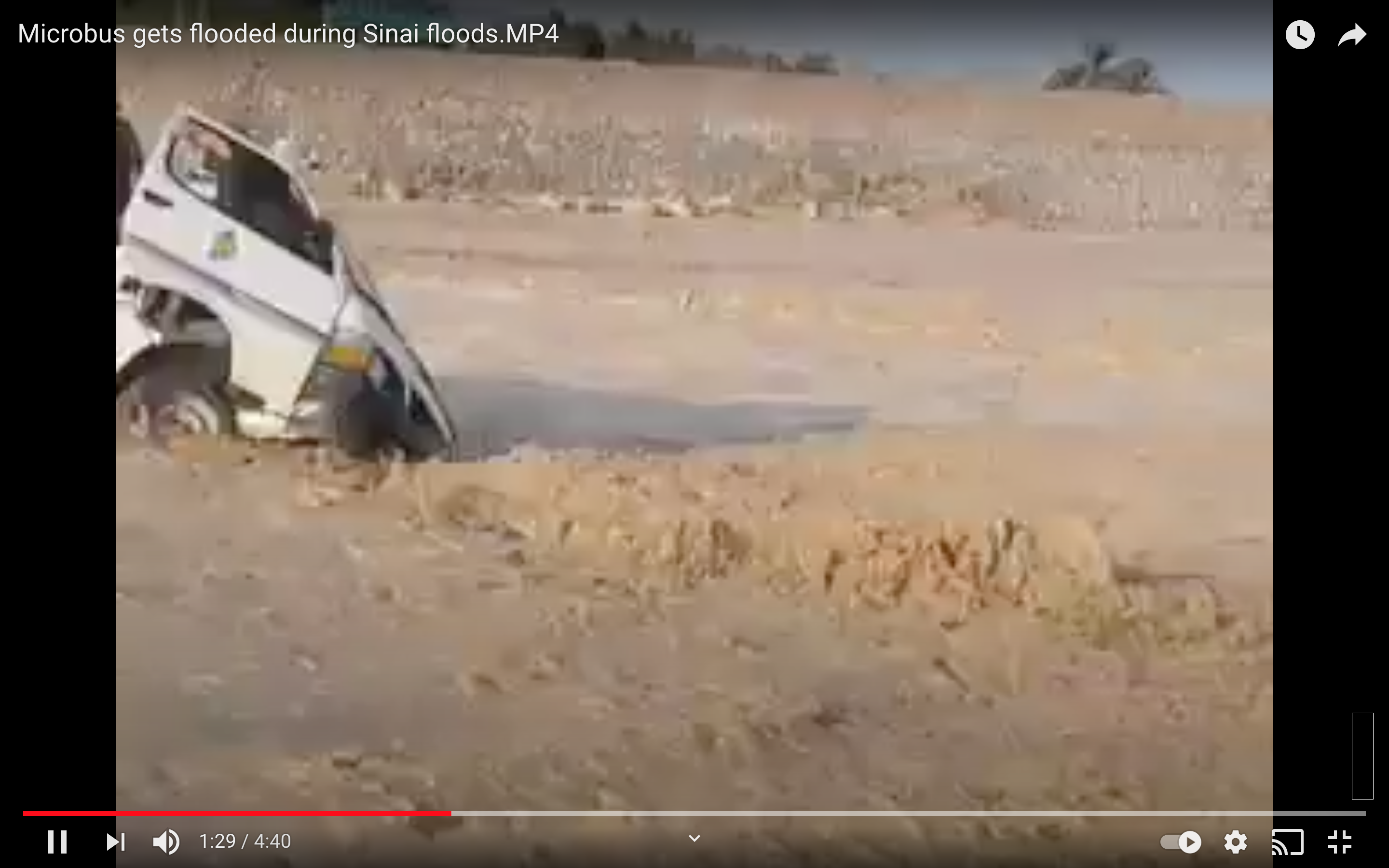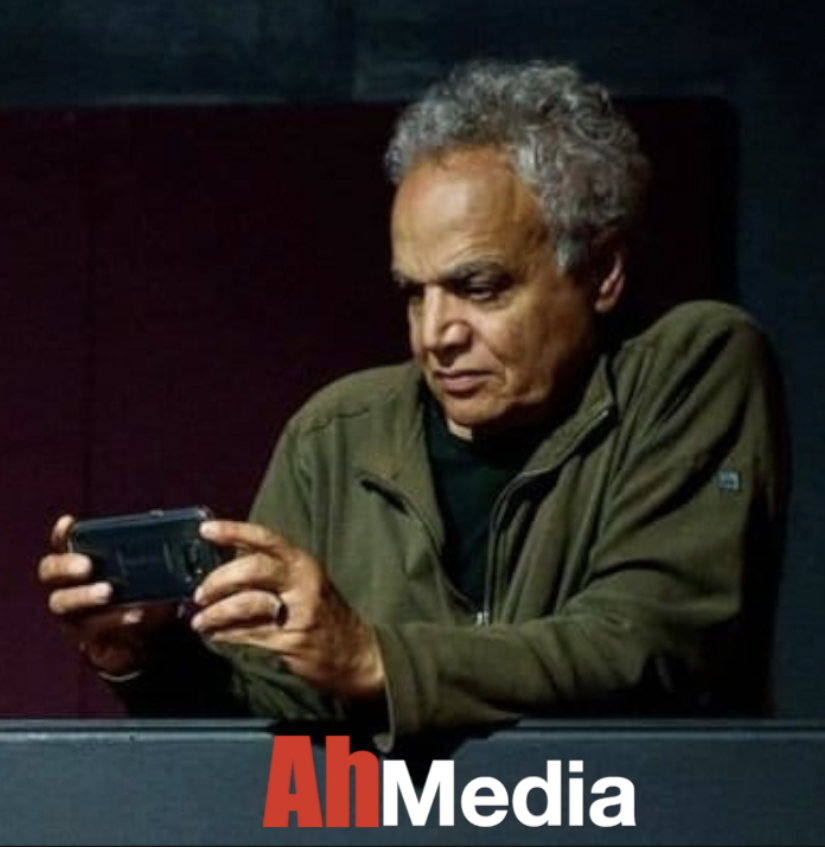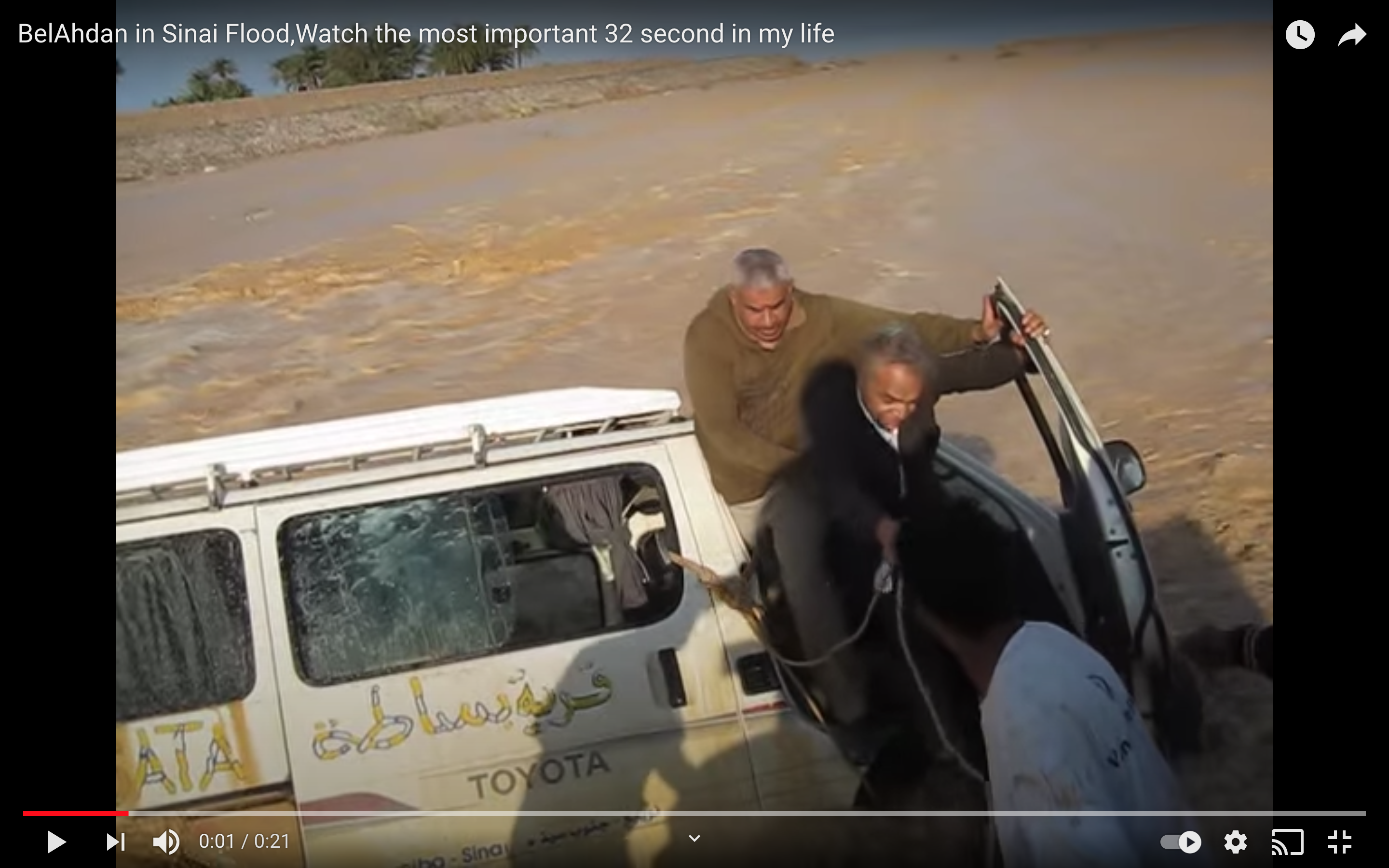Egyptians are resourceful with many problems, they get acquainted and both get coexist with heat, noise, pollution, crowded streets, rationing food, drought, political oppression, corrupt officials, crossing through speeding cars, walking on sidewalks with broken electrical cables. One thing Egyptians can’t deal with is rain. Where life stops and everything from traffic, phones, streets, sewer systems, transportation, work, and electricity.
A few years ago, I went to Sinai with a TV crew to do a documentary. We survived the one-engine plane flight, the lack of any service and information at the Airport, the heat, and the broken sandy road. We stayed at a lovely seafront resort, Al-Basatah (The simplicity). Although it doesn’t rain much in Sinai, the rain never stopped that night. At first, it didn’t seem a problem for us. You could even golf in the rain like this back in Minnesota, we assured ourselves. The rain stopped in the morning, and everything looks clean and dry; the sand drank all the rain, but people were talking about flooding in Sinai, which was a concept that was too hard for me to understand. As far as I knew, the last flood in Sinai was 4,000 years ago, and that hadn’t stopped Moses from crossing the red sea. We needed to get to the Airport to catch our flight back to Cairo. The information about the condition of the road was sketchy, to say the least. In an oral culture like Egypt and especially in the Sinai, everyone is a meteorologist. There was no one to call or a place to get any information about the road conditions. “They heard that the road is open,” said one, and “I heard that a road is closed,” said another. Egyptians are the only people on the planet; if you ask them for directions, they will give you opinions! So with a passionate assurance from our driver,” I have been driving for 30 years, I know the roads,” he told us. So we took off to the Airport. The road was dry; there was water streaming down the sides of the mountainous Southern Sinai, but never enough to stand in our way, until we got to the city of Nuweibaa. There was a long line of cars on the road and people everywhere. In this location, the water was coming down the mountains so hard, and with force, the drop in the road was deep and covered with water, cars could not go through. I had never seen flooding in an area where everywhere else it is dry. So we waited along with everyone else. Almost two hours later, a big truck started making its way across a few more made it safely to the other side of the flooded road. Now it is our turn, and we needed to make a decision.

The driver seemed confident that we could do it since he lived in the area and knew a thing or two about driving through floods. We need to go to the Airport to catch the plane to Cairo; We decided to go ahead and cross the flooded road. I alerted the driver to watch how the other cars were crossing, stay to the right, and drive directly through the incoming water. Whatever you do, don’t turn the wheels. He started slowly moving, and in the middle of the road, as the water was coming down in force, the driver got disoriented and immediately veered to the left. I screamed turn to the right, to the right, asked him what he is doing, stay to the right. The car veered to the left; the driver panicked, the car started falling into the drop off the road to a big lake. The driver started mumbling what seemed to be verses of the Qur’an. I knew immediately we are in trouble.. It was too late to bring the car back on track, and the screaming in the back didn’t help. All I heard was “oh my god” and something that sounded like “shit”. The car tipped on rested on its side, water gushing inside., “What should we do,” screamed Nikki from the back. That was a timely question. We needed to do something in the next few seconds; otherwise, we wouldn’t have the luxury of raising any more questions ever again. The water was coming strong and fast at us in our tipped and half-submerged van and pushing with great force. If I opened the door, what would happen.

We could all drown inside the van, but again, if I didn’t, I wouldn’t be able to open it once we get deep in the water. I took my chances; I opened the door, and it wasn’t too hard to do. I grabbed the driver from his seat; he was in the van’s lowest side, and the water was coming inside. I got out of the van, stood outside the car, and the driver came after me. Nikki opened the window and peeked out of it. All of this took less than three minutes. Then out of nowhere, a tractor came steadily and indeed through the water toward us, and people were coming from everywhere to see the draining Americans; the word was out. A young man went to the front and, from a distance, threw a rope toward us. I caught the rope, and we tied this lifeline to the car’s window frame. It was chaos, hearing everyone screaming, “Jump, Jump !” Where and how we didn’t know. The crew in the car was looking at me to make sense of all of this chaos. I explained what we need to do, jump holding the rope, and hopefully, you would make it to the other side. Lady first, Nikki’s turn, didn’t think it was such a good idea, but she was holding the line. I knew I would be the last one to jump as I was their culture captain of this sinking ship. A young man realized the dilemma that we had. Nikki’s terrified look gave it away. He told me, if he could come as close to the car as possible, the lady could jump on his back. The water was rushing down so hard now that any miscalculation could wash you away, or if you were lucky, into the massive stream. I explained to Nikki what she needed to do, “Jump on his back, and he will take you away,” she reluctantly agreed, trusting the young man holding her more than the rope. It worked; the cheering crowd testified to that. We got the American from the car, screamed a few.
They took Nikki away to safety. Next was Fred, who was hanging from the window; he didn’t need to be convinced. His small frame was flying over to the rope with such elegance, and I envied him. As he was hanging on to the rope by his armpits, they grabbed him out of the water. He climbed on the tractor, and as a journalist, he never forgot his profession. He took his phone and started taking video of the rest of the rescue, a behavior that some of the Bedouins didn’t wholly understand. “During a crisis, you should be helping, not videotaping,” one Bedouin said jokingly. Tom’s rescue was so smooth since he had seen a few before him, so I didn’t have to give him any instructions. He knew the drill, no sweat, in seconds, he was in the other side in safety. Now, it was me, and the driver left. I asked the driver to go next, but he refused. Besides, he was behind me in the order of things. I knew what to do, and I wasn’t afraid to do it. Fear never crossed my mind through this entire ordeal. Fear only comes when you have choices, which I had none. I jumped, but it wasn’t far enough from the van. One of the young men tried to grab me, but he was almost washed away. I had to grab him and pull him back from underwater. Finally, with the strong arms of his brother helping me, I made it to safety. They had to work harder on this one; the water was deep and more robust on my side of the car. The driver came last, and his rescue was much more comfortable and safer than the way he had driven the car. We were all shocked and disoriented, sitting wondering what just happened and if it was a reality TV show. Although we lost our van, some of our equipment, gifts, and clothes, we gained many Bedouin friends–those amazing strangers who risked their lives to save us. I thank you all. I may not know their names, but l will never forget their faces.
watch the video taken by Fred, ..

